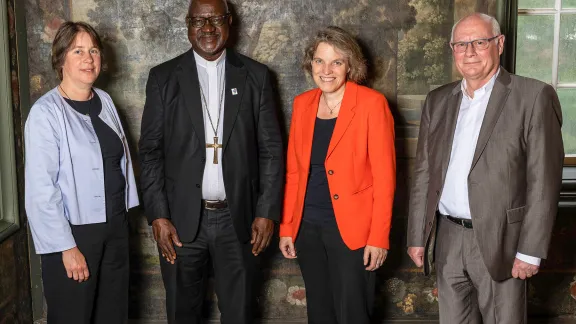Witnessing to Christ in word and prophetic diaconal ministry

Visiting Hamburg during a ten-day trip to Germany. From left: Nordkirche Secretary for Theology, Ecumenism, Diakonia Uta Andrée, LWF President Panti Filibus Musa, LWF Vice-President for Central and Western Europe Astrid Kleist, and General Secretary of the GNC/LWF Norbert Denecke. Photo: Thomas Krätzig
(LWI) – “I am impressed by the churches’ commitment to the LWF communion’s vision of witnessing to Christ in word and prophetic diaconal service,” said The Lutheran World Federation (LWF) President and Archbishop of the Lutheran Church of Christ in Nigeria Panti Filibus Musa after a ten-day trip to Germany from 13-23 June. “I am deeply encouraged by their mutual partnerships and ecumenical engagement at the global and local levels.”
The LWF President’s visit began in Stuttgart, where he met with the Leading Bishop of the Evangelical Lutheran Church in Württemberg and LWF Council member Frank Otfried July. In addition to this stop at the LWF member church in southern Germany was a meeting with the Leading Bishop of the Evangelical Lutheran Church in Northern Germany, Kristina Kühnbaum-Schmidt. She is also vice-chair of the German National Committee of the Lutheran World Federation (DNK/LWB).
“I was very pleased to have personal discussions with the LWF President,” Kühnbaum-Schmidt said. “The LWF’s internationally highly recognized work in helping people in emergencies and crises, regardless of their status or religious confession, especially those fleeing, is essential. In addition, I am very impressed by the great commitment of The Lutheran Church of Christ in Nigeria to combat causes of irregular migration, its work with returnees, their commitment to education, and especially the personal commitment of Archbishop Musa regarding climate change and climate justice. These issues are central to our work in the Northern Church and were, therefore, the focus of our meeting.”
In Berlin, President Musa met with the President of Bread for the World, Dagmar Pruin. This development agency of the Protestant churches in Germany is globally engaged. It has been a strong partner of the LWF for decades, especially concerning the humanitarian work through LWF World Service, projects in member churches, or scholarship programs.
In Wittenberg, the LWF President signed the city’s Golden Book and learned about the work of the LWF Center Wittenberg. Here, the GNC/LWF conducts courses on behalf of the LWF, training pastors, lay people in church leadership positions, and newly elected church leaders. He also visited the Luthergarten. This is a living, international, ecumenical monument to the 2017 Reformation anniversary comprised of 500 trees planted by church representatives across the world.
The Evangelical Lutheran Mission in Lower Saxony (Evangelisch-lutherisches Missionswerk in Niedersachsen – ELM) sees itself as a bridge-builder between cultures and religions, partnering with 22 churches in 18 countries. At this ministry’s headquarters in Hermannsburg, the LWF President was welcomed for the annual partner church consultation. Gender justice, climate justice, justice and peace, and just structures in church governance were the challenging topics of the conference.
President Musa held a keynote speech titled “The shepherd in the 21st century”. “A shepherd in the Biblical context is someone caring for people,” he said. “God has always called men and women in different generations to take leadership and walk with people in church and society. When discussing shepherding in the 21st century, it is about mobilizing men and women with their various gifts. We also need to ensure an environment for them to exercise those gifts so that all of us can be enriched and nurtured to fulfill our common vision of being a prophetic voice in society.”
LWF Vice-President for Central and Western Europe, Pröbstin Astrid Kleist, welcomed President Musa to Hamburg. She referred to the recent LWF Council meeting in Geneva, which he had led. There, among other things, the consequences of the war in Ukraine had been on the agenda. Discussions focused on the situation of those directly affected by the war and on people in African countries suffering from dramatic food and energy shortages.
“Irregular migration and displacement concern us all!” said Kleist. “No one can say they have nothing to do with it or bear no responsibility. However, welcoming strangers among us and setting symbols of hope in the countries they come from is central to our Christian mission.”
By LWF/A. Weyermüller


